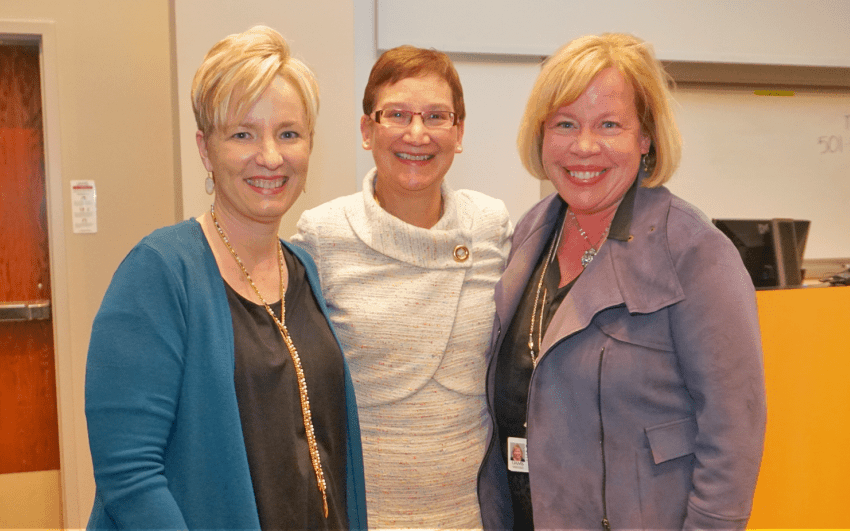Doctor, Researcher, Inventor Offers Lessons in Perseverance
| Feb. 2, 2018 | Drawing on her early career experiences with rejection, Carrie Byington, M.D., offered some advice during a Jan. 29 lecture at UAMS.
As a new physician researcher, Byington, now dean of the Texas A&M College of Medicine, said all of her initial research papers in 1995 were rejected.
“Not by one reviewer – by reviewers 1, 2 and 3,” said the UAMS Translational Research Institute Distinguished Lecturer. “And they all said the same thing: PCR (polymerase chain reaction) will never be used in the clinical lab.”
PCR is now a common technique for rapidly diagnosing infectious diseases.
“It seems laughable now,” she said. “Just don’t listen when people tell you it will never happen.”
Byington spent two days in Little Rock, visiting the UAMS and Arkansas Children’s campuses. Her visit was sponsored by the UAMS Translational Research Institute (TRI).
Byington joined Texas A&M in 2017 after a 21-year career at the University of Utah, where she was the H.A. and Edna Benning Presidential Professor of Pediatrics, vice dean for academic affairs and faculty development in the School of Medicine, and associate vice president for faculty and academic affairs at the University of Utah Health Sciences Center.
A federally funded investigator with continuous support as principal or co-investigator totaling about $80 million since 1998, Byington’s research spans the translational spectrum from basic laboratory science to health services research and has focused primarily on bacterial and viral respiratory pathogens in children. Her scholarship led to the co-invention of FilmArray®, a novel diagnostic platform that automates the detection of over 100 infectious organisms in a single sample in about an hour with BioFire Diagnostics of Salt Lake City, later acquired by bioMérieux. The FilmArray® System is used in hospitals in the United States, Europe and Asia and has changed the landscape for the detection of infectious disease diagnostics and research.
Her research background in translational science also led to the development of the Utah Center for Clinical and Translational Science, a member of the National Institutes of Health (NIH) Clinical and Translational Science Awards Program national consortium since 2008.
Byington noted that during her career, her work has taken her through all phases of translational research.
“I’ve moved back and forth across this continuum, and what I’ve learned is that it’s all important. Every single bit of it,” she said. “I hook, line and sinker believe in translational medicine, translational science.”
Addressing an audience that included many TRI faculty leaders, Byington said: “I know you all are working hard here with your CTSA application, and I just can’t tell you how important it is to break down barriers and to really move your science in directions you never could take it by yourself.”
In May, TRI will submit its application for five years of Clinical and Translational Science Awards (CTSA) Program funding from the NIH National Center for Advancing Translational Sciences (NCATS).
A nationally renowned physician scientist, Byington has had numerous career accomplishments including awards from the Robert Wood Johnson Foundation, the Centers for Disease Control and Prevention, and NIH. She is an elected member of the National Academy of Medicine and serves as chair of the American Academy of Pediatrics Committee on Infectious Diseases. She also served as chair of the Infectious Diseases Advisory Group to the U.S. Olympic Committee and was tasked with protecting Team USA athletes and staff during the 2016 Olympic and Paralympic Games in Rio de Janeiro, Brazil.
